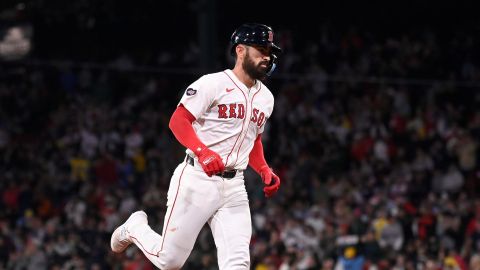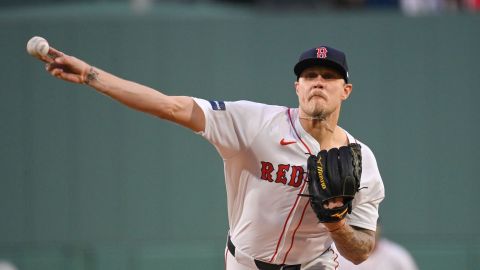Editor's note: Drew Garland contributed this story to NESN.com.
It's that time of year again. A chill comes over the air and the boys of summer vie to become the men of fall. Baseball is the ultimate pseudo-team game. Beat writers and scholars will preach the importance of a united clubhouse and how disruptive personalities can derail a potential October run.
While that is certainly true in some cases (ask Terry Francona), baseball is not a "team" game, especially when viewed through the lens of the other three major sports. Hockey shouldn't need an explanation; just look at what the Boston Bruins did last season. Sidney Crosby played half the NHL season and scored more goals (32) and had more points (66) than anyone on the Bruins' roster. The Bruins got it done based on timely scoring, cohesion and incredible defense (and some Tim Thomas sprinkled in there, too). Basketball masquerades as an individual sport sometimes, but this only leads to inevitable failure. Case in point — every team LeBron James has ever been on. And football, the ultimate team game, needs little explanation in that regard. You try running a power sweep when one person on the offense doesn't do his job.
So if baseball is clearly predicated on individual success, why is it so hard to define who the most valuable player should be each year? Writers quibble over exactly what the word "valuable" means in regard to the award. Shouldn't it be the best player on the best team? Shouldn't it be the player with the best numbers, regardless of team success? It gets broken down even further when one questions if pitchers and position players should be weighted the same. A dominant pitcher is what he is — dominant. But, how valuable can you be when you play one-fifth of the games that everyone else in consideration does?
This once again is a hot-button issue in MLB this season. Seemingly no one knows who deserves to win the MVP, in either league, really. In the American League, it's especially murky. The player with the best traditional numbers is Jose Bautista of the Blue Jays, but he won't be putting the 2011 AL MVP award on his mantel. He led the AL in home runs (43), walks (132), slugging percentage (.608), and OPS (1.056, one of only two eligible players above 1.000.) So he should win, right?
Not so fast, my friend.
The Toronto Blue Jays finished at exactly .500 with an 81-81 record, leaving them 16 games behind the AL East-champion New York Yankees. If Bautista is so valuable, why didn't his team win more? Actually, advanced metrics tells us that without Bautista, the Blue Jays would have been much worse.
I, like every other 20-something baseball fan, saw Moneyball. While the film may have given some events the old Hollywood treatment (I don't remember Billy Beane being so darn handsome), it raises a great point. Beane and Peter Brand (err … Paul DePodesta … am I allowed to say that?) didn't start the stat revolution, but they certainly popularized it. Baseball, by all means an archaic game that has been played professionally for 136 (or 141, depending on who you ask) years, is a curmudgeon when it comes to change. The film personifies this with Beane (representing sabremetics and advanced analysis) butting heads with his team of scouts (representing the old guard) when the latter searches for new talent under the antiquated "it" factor. MVPs are still chosen based on the "it" factor. Jacoby Ellsbury, for example, has recently been dismissed as a top candidate because of his team's September failure, despite his stellar numbers for the month/season.
Adding sabermetric analysis to the MVP debate can help clear things up. Using statistics such as WAR (wins above replacement, which measures how many wins a player's team would lose if he was replaced by an average player) and WPA (win probability added, which, based on situation, measures how a player impacts a game), value can start to have a definition. Now, we don't need to all be on bended knee at the temple of Bill James, but his analysis gives mathematical proof to baseball value. If we look at the last five AL MVP winners, we see how they stacked up in sabermetrics among the MVP vote-getters.
2010: Josh Hamilton — 7.0 WAR (third in AL), 6.3 WPA (second in AL)
2009: Joe Mauer — 7.9 WAR (second in AL), 3.7 WPA (third in AL)
2008: Dustin Pedroia — 5.2 WAR (eighth in AL), 3.0 WPA (eighth in AL)
2007: Alex Rodriguez — 9.9 WAR (first in AL), 7.5 WPA (first in AL)
2006: Justin Morneau — 3.8 WAR (19th in AL), 4.6 WPA (fifth in AL)
So from what the numbers tell us, Pedroia and Morneau probably didn't deserve their awards. Hamilton and Mauer were understandable, and Rodriguez ran away with his. Now let's look at the 2011 AL MVP candidates.
Jose Bautista — 8.5 WAR (Tied for first), 8.0 WPA (first)
Jacoby Ellsbury — 7.2 WAR (second), 6.2 WPA (third)
Miguel Cabrera — 7.1 WAR (third), 7.6 WPA (second)
All three are fine candidates. It should also be noted that Justin Verlander is tied with Bautista at 8.5 WAR. Miguel Cabrera's team performed the best out of the three candidates above, so should the award be his? Even though he's almost a win and a half behind Bautista, it seems like he would be the winner that would most please both the new and old schools of thought.
Baseball will never be as cut and dry as the other three major sports. In the NFL, a quarterback has won MVP eight out of the last 10 years (Steve McNair and Peyton Manning, both QBs, shared the 2003 award). Seemingly, a quarterback should win the MVP every year, for he is the most important position on the field (some, including myself, would call it the toughest position in sports). The past eight Hart Memorial Trophy winners in the NHL have led the league in either goals scored or total points scored. While basketball has no one true stat to point at, it's much easier to find a polarizing player for each season. Rarely is there ever much of a debate. The closest debate in recent memory was Steve Nash's first MVP in 2004-05, when he received 65 first-place votes to Shaquille O'Neal's 58 first-place votes.
It's tough to tell baseball writers who have been viewing the sport and its MVPs the same way for years upon years to change and take some mathematical equations into account. It will be a gradual process. The MVP award is far from arbitrary and it should be taken seriously every season. If baseball writers continue to make it some sort of popularity contest among themselves, it will lose its prestige. We are given numbers that prove a player's value every season, a statistical base that proves worth. With the implementation of this analysis, the "value" can be defined and restored in the Most Valuable Player award.



